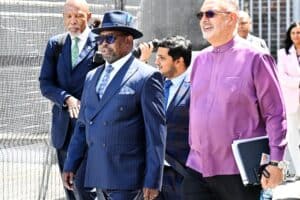Changes to the Income Tax Act make the winding up of an estate a never-ending process.

Changes to the Income Tax Act which affect the estates of deceased persons have been causing practical problems during the winding up of estates.
Tax leakage from the time of death until the final winding up of the estate has led to an amendment where income is no longer allowed to flow through the estate to an heir or beneficiary.
Since March last year the deceased estate must account for all income and capital gains or losses until the liquidation and distribution account becomes final.
However, during the time from when the account is being drawn up and the time it becomes final, income continues to accrue in the estate, which means the account must be drawn up again to account for the income.
The liquidation account is basically a recording of all the assets and liabilities within the estate and the distribution account is who will benefit, and how much of the assets must be distributed to them once the liabilities have been accounted for.
Cheryl Howard, MD of Talaria Wealth, says it takes time to wind up an estate. In many instances beneficiaries were not aware that income was accruing to them during the winding up process.
This income was not declared in their income tax returns, and the tax on it was lost to the South African Revenue Service (Sars). Howard says this was not because of neglect, but simply because they were unaware of the income accruing to them.
She says Sars’ concerns about the tax on this undeclared income, which has been falling through the cracks, is understandable. However the change – where the income remains in the estate until the liquidation and distribution account is final – causes practical problems.
In terms of the process the account must be left for inspection at the office of the Master of the High Court for a specific time to allow for people (aggrieved beneficiaries, creditors or ex-spouses) to object. Sars will also have to audit the account before it becomes final.
Howard says during this period income such as rental from properties in the estate, dividends from a share portfolio or cash from a bank account that was closed can still accrue in the estate.
“You keep going in a complete circle. As you get to a point where you determine the tax to be paid, the account (liquidation and distribution account) is still open for inspection. Income is still accruing so more tax is payable which needs another liquidation and distribution account to be drawn up.”
The South African Institute of Tax Professionals (Sait) says in a submission to Sars the concern is in the wording “when the account becomes final” and not “when the account is drawn”.
In practice income continues to accrue after the liquidation and distribution account has been drawn up. This income, according to the draft guide to capital gains tax, must be taxed in the estate.
“This would require further income tax returns to be submitted and assessed, and this liability would not have been reflected in the liquidation and distribution account, and if it had been may have prompted further objections.”
Erika de Villiers, head of tax policy at Sait, says in the submission that while these revised assessments are being finalised, further income could continue to arise, which would require yet further returns and assessments. The process goes on ad infinitum.
Sait has requested an amendment to the effect that the estate must account for income up to the point where the liquidation and distribution account is drawn up and not when it becomes final.
Howard says the issue now is that once the account is “final” anything that has subsequently accrued will be the responsibility of the heir or beneficiary.
She explains that before the change, and where beneficiaries were actually aware that they had a tax liability before the estate was finally wound up, they had to pay the tax even though they had not yet received the assets on which they were taxed.
This has had a major impact on the cash flow of beneficiaries.
Following the change (where the income stays in the estate until the account is “final”) the executor can pay the tax with assets that are still in the estate.
The additional income that may accrue after the winding up and until the asset is transferred to the beneficiary will be the responsibility of the beneficiary.
Howard says this liability can also be severe and beneficiaries may have to sell some of the assets to pay the tax.
Taxpayers who realise that they cannot afford an asset have the right to renounce it, but they cannot exchange one asset for another in the estate.
Brought to you by Moneyweb
Support Local Journalism
Add The Citizen as a Preferred Source on Google and follow us on Google News to see more of our trusted reporting in Google News and Top Stories.






